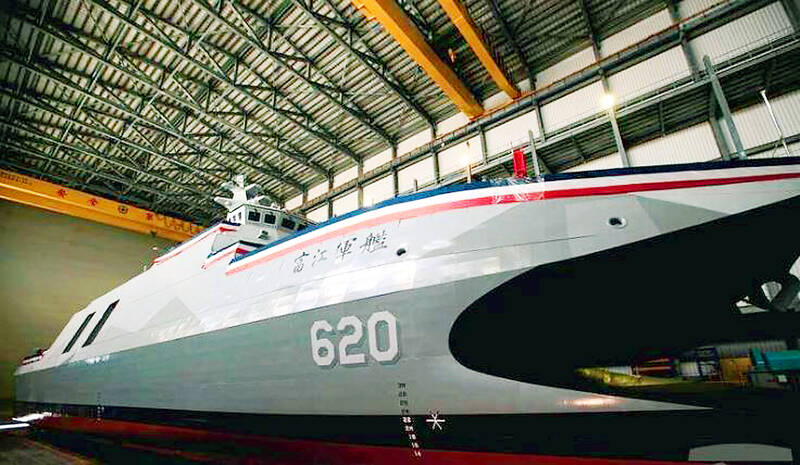The navy is expected to take delivery of the nation’s second domestically built Tuo Chiang-class corvette next month, a military source said yesterday.
The Tuo Chiang-class corvette is a fast, stealthy multipurpose warship designed and manufactured locally for the navy.
A prototype of the corvette named Tuo Chiang (PGG-618) was commissioned in 2015. The first complete Tuo Chiang-class corvette, the Ta Chiang, was launched in December 2020.

Photo courtesy of the Military News Agency
The second corvette, the Fu Chiang, was launched in September last year, while the third, the Hsu Chiang, was launched in February.
The Fu Chiang is to be delivered to the navy some time next month, a military source said, adding that official training would be conducted on the corvette before it is commissioned to the armed forces.
The Tuo Chiang-class corvette has a maximum speed of 30 knots (55.6kph), a displacement of 685 tonnes and an operational range of 1,800 nautical miles (3,334km), the navy has said.
It was developed to address a common weakness of traditional small warships, such as patrol craft and corvettes: They are not fit for use over extended periods of time in the rough seas around Taiwan.
The Tuo Chiang-class corvettes are fitted with subsonic Hsiung Feng-II missiles, supersonic Hsiung Feng-III anti-ship missiles, a 76mm cannon and Tien Chien II air-defense missiles.
The Tuo Chiang is named after a former patrol vessel deployed in defense against Chinese warships in a Taiwan Strait sea battle in 1958.
The Fu Chiang and the Hsu Chiang are named after rivers in Hualien County and Keelung.
Their names were selected following a public vote.
Taiwan plans to build a total of 11 Tuo Chiang-class corvettes by the end of 2026.

MAKING WAVES: China’s maritime militia could become a nontraditional threat in war, clogging up shipping lanes to prevent US or Japanese intervention, a report said About 1,900 Chinese ships flying flags of convenience and fishing vessels that participated in China’s military exercises around Taiwan last month and in January last year have been listed for monitoring, Coast Guard Administration (CGA) Deputy Director-General Hsieh Ching-chin (謝慶欽) said yesterday. Following amendments to the Commercial Port Act (商港法) and the Law of Ships (船舶法) last month, the CGA can designate possible berthing areas or deny ports of call for vessels suspected of loitering around areas where undersea cables can be accessed, Oceans Affairs Council Minister Kuan Bi-ling (管碧玲) said. The list of suspected ships, originally 300, had risen to about

DAREDEVIL: Honnold said it had always been a dream of his to climb Taipei 101, while a Netflix producer said the skyscraper was ‘a real icon of this country’ US climber Alex Honnold yesterday took on Taiwan’s tallest building, becoming the first person to scale Taipei 101 without a rope, harness or safety net. Hundreds of spectators gathered at the base of the 101-story skyscraper to watch Honnold, 40, embark on his daredevil feat, which was also broadcast live on Netflix. Dressed in a red T-shirt and yellow custom-made climbing shoes, Honnold swiftly moved up the southeast face of the glass and steel building. At one point, he stepped onto a platform midway up to wave down at fans and onlookers who were taking photos. People watching from inside

Japan’s strategic alliance with the US would collapse if Tokyo were to turn away from a conflict in Taiwan, Japanese Prime Minister Sanae Takaichi said yesterday, but distanced herself from previous comments that suggested a possible military response in such an event. Takaichi expressed her latest views on a nationally broadcast TV program late on Monday, where an opposition party leader criticized her for igniting tensions with China with the earlier remarks. Ties between Japan and China have sunk to the worst level in years after Takaichi said in November that a hypothetical Chinese attack on Taiwan could bring about a Japanese

The WHO ignored early COVID-19 warnings from Taiwan, US Deputy Secretary of Health and Human Services Jim O’Neill said on Friday, as part of justification for Washington withdrawing from the global health body. US Secretary of State Marco Rubio on Thursday said that the US was pulling out of the UN agency, as it failed to fulfill its responsibilities during the COVID-19 pandemic. The WHO “ignored early COVID warnings from Taiwan in 2019 by pretending Taiwan did not exist, O’Neill wrote on X on Friday, Taiwan time. “It ignored rigorous science and promoted lockdowns.” The US will “continue international coordination on infectious